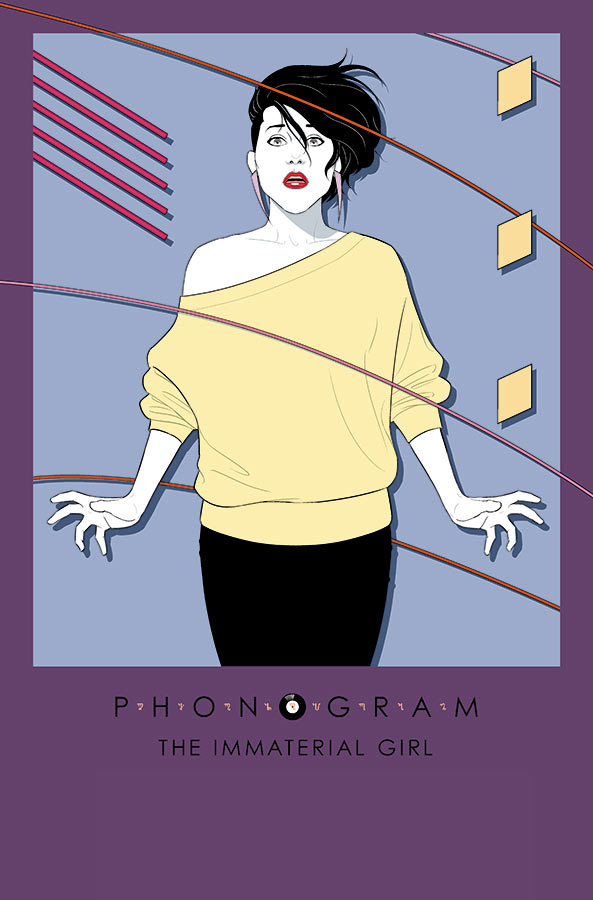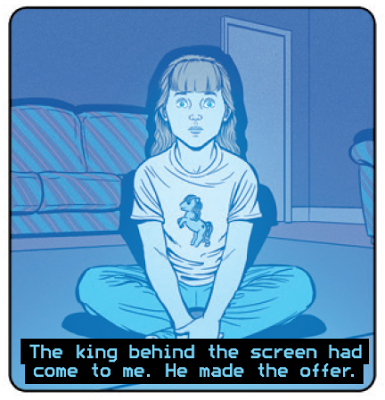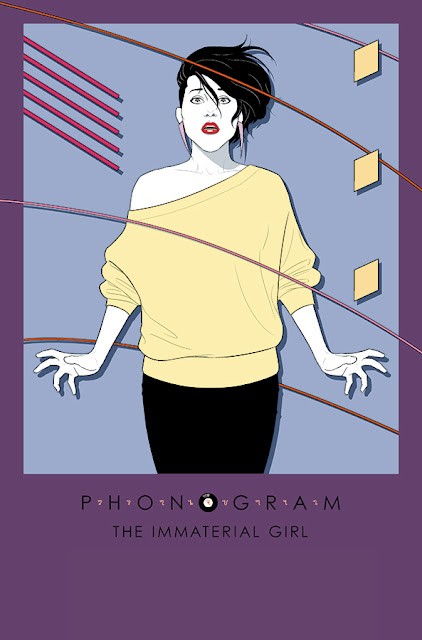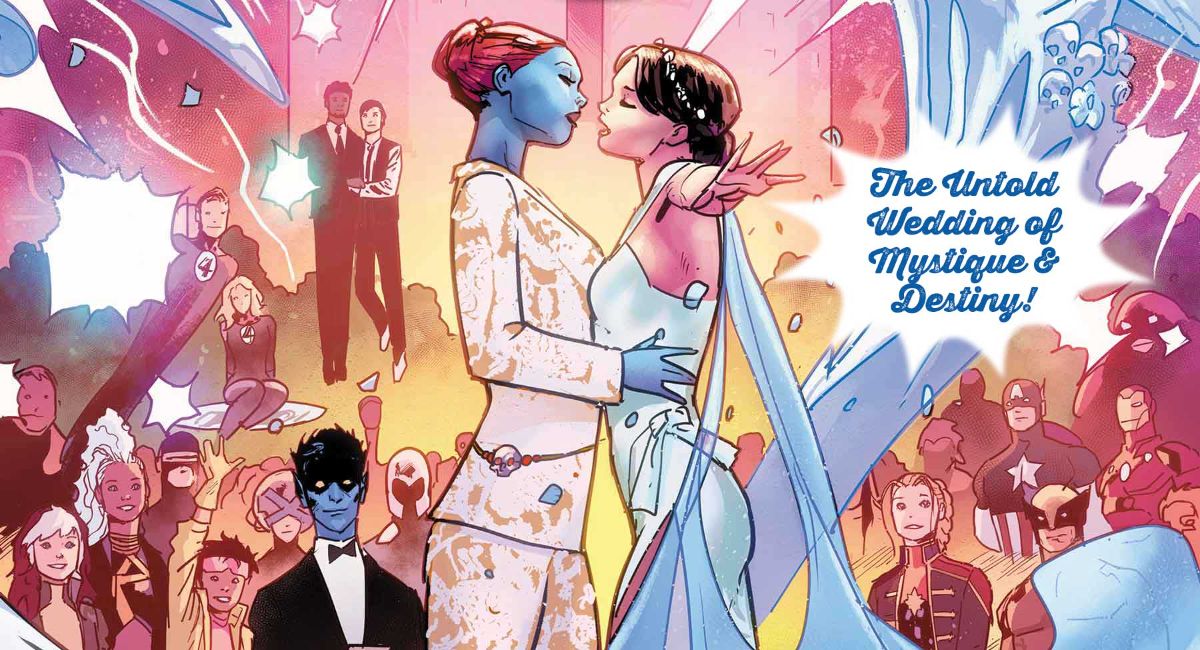By Cal Cleary
“… what really matters is what you like, not what you are like.” – High Fidelity
Welcome back to Phonogram, Kieron Gillen and Jamie McKelvie‘s long-running ode to music, criticism, and… well, themselves, kind of? In Phonogram, we deal with Phonomancers, a group of magicians who draw their power from music. Not music they make, but music they appreciate, analyze, discuss, and disseminate. They draw their power by dancing to “Pull Shapes” or by inspiring retro music revivals.
Alternatively, in the case of Phonogram: The Immaterial Girl, the third book in Gillen and McKelvie’s ongoing Image series, they draw power from music videos. We rejoin Emily Aster, she of the sharp tongue and sharper hair in previous Phonogram books, as the jaded phonomancer whose reflection in the mirror was a different person – one who appeared to deeply hate the material Emily. Here, we begin to learn where that hate stems from, what kind of deal Emily made, and what that means for her life going forward.
Phonogram: The Immaterial Girl opens in ‘1980-something South London-ish’ with young Emily reminiscing on the few months when she had access to satellite TV as a child, where she discovered music videos – and, in an eerie sequence borrowing from Poltergeist (the good one, not the 2015 remake), is made an offer by a creature inside her TV. She turns the thing down… then. But her resolve doesn’t last long. Next time we see Emily, she’s footloose and fancy free, the center of attention at the coolest parties, a phonomancer who hobnobs with the best of ’em.
Much of the issue is set-up, re-introducing us to these characters and their world, but that sort of thing is what Gillen and McKelvie often do best. Few comics so thoroughly capture the voice of any given character in just a line or two the way Gillen can. Hell, you could strip most of the words out of the book and still ‘get’ the characters on a pretty fundamental level thanks to McKelvie’s art.
Take the sequence above: Emily drops the finished cigarette in a puddle whose reflection doesn’t match her fashionable heels, immediately grabs another one, lights up, and tosses the empty carton over her shoulder. Fashionable, confident to the point of being cocky, but with a supernatural secret. McKelvie’s panels can sometimes feel a bit static, but he and colorist Matt Wilson have an undeniable feel for character, for the faces, the outfits, the walks that tell us who these people are, and who they want everybody to think they are.
However, eventually, plot does happen. The inciting event for the mini-series occurs near the end of the issue, and at first, I was disappointed. But then I turned the page, and there was Jamie McKelvie with a chillingly pared-back sequence that manages to mine a classic 80s music video for a not-inconsiderable amount of menace. It was a weird, pop-inspired left turn that, frankly, left me a little giddy to see where they plan to take the series next. If you, like me, aren’t as well-versed in the pop music of the last few decades as you might wish, you don’t need to worry: Gillen and McKelvie’s storytelling doesn’t use its references as a crutch, but as a signpost. You may not know who the Sugababes are but you’ll know what to think of Seth by how he talks about them. It’s a tough line to walk, but Gillen does it very well.
McKelvie and Wilson have crafted an expressive, lively book. The backgrounds are often minimalistic, bare walls or even just splashes of color meant to highlight the tone of the moment, but their sense of design is phenomenal. The world ‘behind the screen’ is creepy in impressively diverse ways every time we visit, for example, a consistently off-putting place that counters the mundanity of the real world. But even there, Wilson’s colors tend to get us into the heads of his characters. The pulsing reds, purples, and blues of the club scene are energetic, infectious – they aren’t like any club I’ve been to, but they capture the feeling of every club I’ve been to. Flash forward to find all these characters years older and dealing with the day to day work of life, and find yourself surrounded by dull, samey beige everywhere you look, color only slipping in with the rare display of magical power.
The single issues – and not the trades – also contain ‘B-sides’, short comics with guest creators playing with the same themes. In the first issue, Gillen presents “Everything and Nothing,” written by him and illustrated by Sarah Gordon, and “Blurred,” written by him and illustrated by Clayton Cowles & Kelly Fitzpatrick. Both shorts are solid; the first is a melancholy look at the way music, even ‘bad’ music, can bring memories vividly to life, while the second is a very brief look at aging, loving whatever you want to love, and just a teensy bit of pop snobbery. Consider both strong reasons to pick up the single issues rather than waiting for the trade on this particular book.
The Phonogram team, from page 1 all the way through the B-sides, understands the passion that art inspires and the way it can change your life– for better or for worse. The way you can get lost inside your love, lose a piece of yourself, or reinvent yourself completely. Emily Aster sacrificed a part of herself to an artform she loved a long time ago, and as that artform dies quietly, she finds that her decision may have come with consequences she hadn’t imagined. Phonogram: The Immaterial Girl #1 feels just a bit slight at times, as set-up heavy as it is, but it’ll speak deeply to those who listen, read, or watch with a passion that could be – in some – confused with insanity. Fans of Gillen & McKelvie’s more up-tempo The Wicked + The Divine or Young Avengers should check this out, of course, but more broadly, I think fans should check this out, people who deeply, passionately give a shit about what they read, watch, listen to, whatever.
Phonogram: The Immaterial Girl #1 was written by Kieron Gillen, illustrated by Jamie McKelvie, colored by Matt Wilson, and lettered by Clayton Cowles, with back-up stories illustrated by Cowles, Kelly Fitzpatrick, and Sarah Gordon. Released August 12th, 2015, Phonogram: The Immaterial Girl #1 is the first issue of a 6-part mini-series published by Image Comics and costs $3.99.












